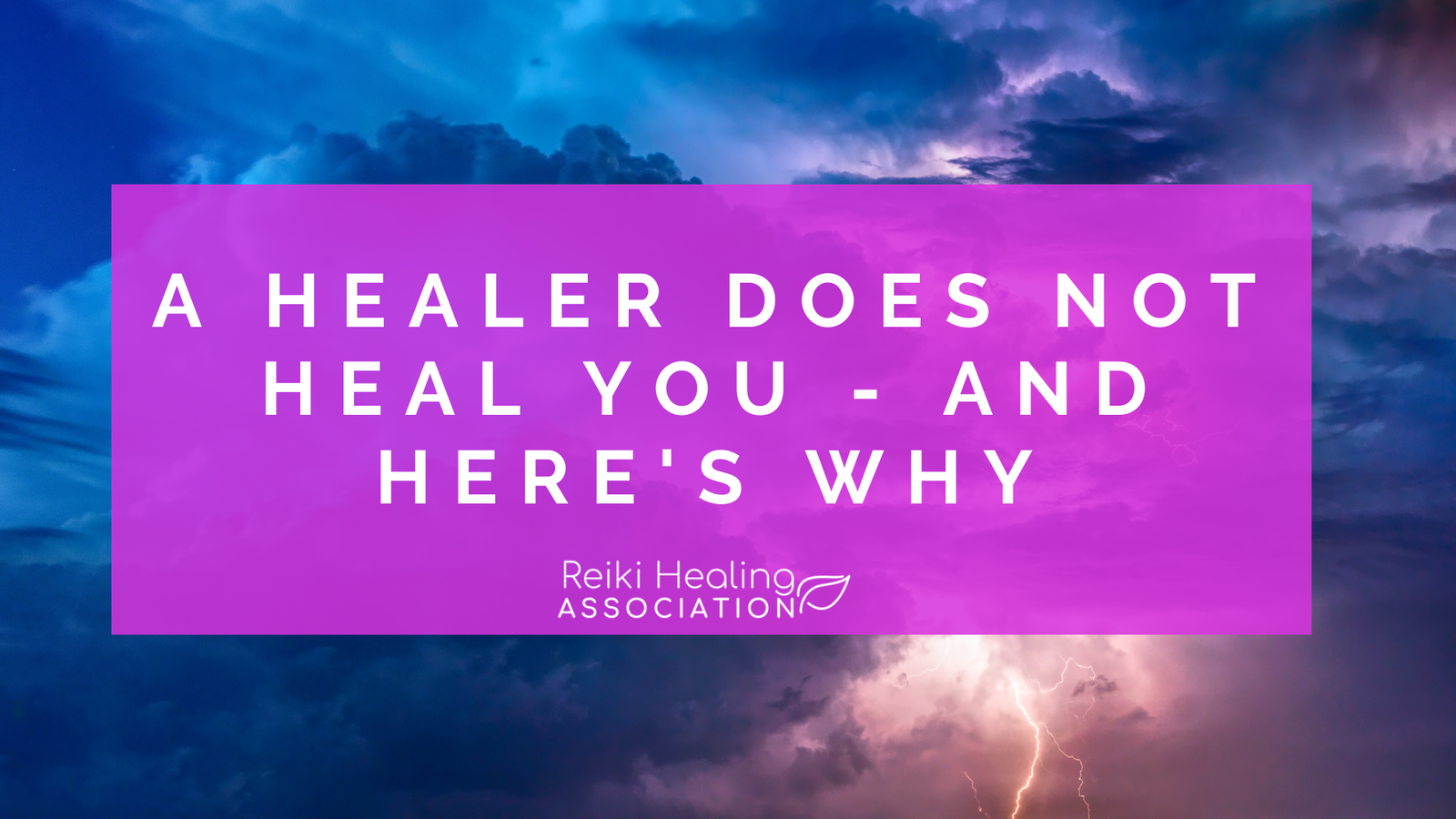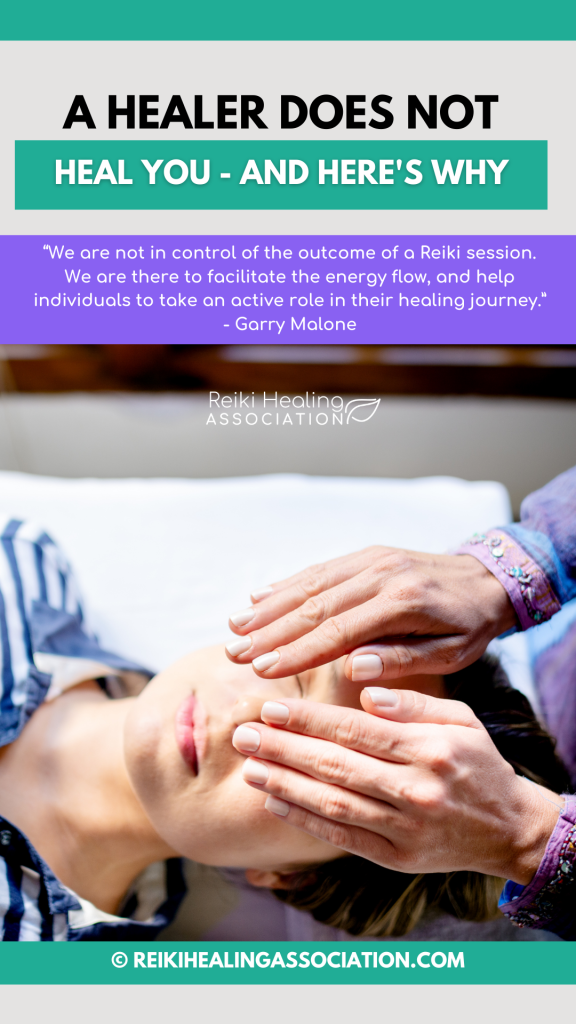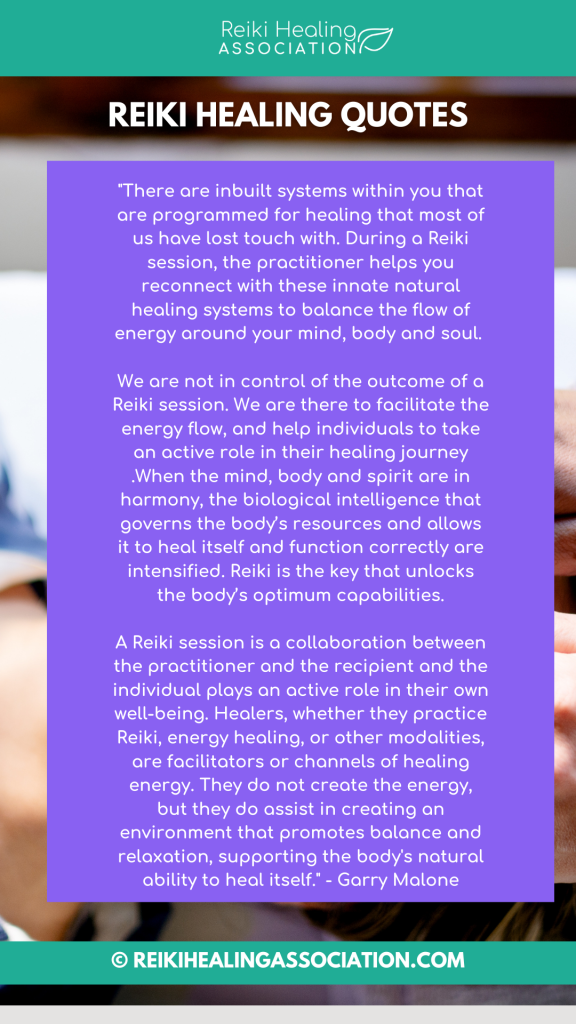
A reiki healer does not heal you – and here’s why
“A healer does not heal you. A healer is someone who holds space for you while you awaken your inner healer, so that you may heal yourself.” Maryam Hasnaa
We see a lot of spiritual practitioners using the word healing, but we have to be really careful claiming that we are healing our clients as Reiki Practitioners.
Reiki is a healing technique, but we are not directly healing our clients as energy practitioners. Reiki is a a catalyst for healing, helping to restore balance, remove blockages, and promote a sense of harmony on spiritual, emotional, and energetic levels.
In the words of Garry Malone, Founder of the Reiki Healing Association:
“There are inbuilt systems within you that are programmed for healing that most of us have lost touch with. During a Reiki session, the practitioner helps you reconnect with these innate natural healing systems to balance the flow of energy around your mind, body and soul. We are not in control of the outcome of a Reiki session. We are there to facilitate the energy flow, and help individuals to take an active role in their healing journey .When the mind, body and spirit are in harmony, the biological intelligence that governs the body’s resources and allows it to heal itself and function correctly are intensified. Reiki is the key that unlocks the body’s optimum capabilities.”
“A Reiki session is a collaboration between the practitioner and the recipient and the individual plays an active role in their own well-being. Healers, whether they practice Reiki, energy healing, or other modalities, are facilitators or channels of healing energy. They do not create the energy, but they do assist in creating an environment that promotes balance and relaxation, supporting the body’s natural ability to heal itself.” – Garry Malone
This perspective that the healer is not healing you, doesn’t dismiss the skills and intentions of the healer. Healers play a valuable role in providing support, guidance, and a healing environment. The concept just emphasizes a broader understanding of energy healing, where healing is viewed as a collaborative process between the healer and the person seeking healing. It involves the recipient’s willingness to participate actively in their healing journey – this involves self-reflection, lifestyle adjustments, and a commitment to overall well-being.

Reiki is Holistic
While traditional medicine often focuses on treating symptoms, holistic approaches aim to address the person as a whole, recognizing the interplay of various factors that contribute to health and vitality.
In Reiki and similar holistic therapies, practitioners view the body as an energy system, and imbalances in this energy can manifest as physical, emotional, or mental symptoms. Sometimes physical symptoms may be linked to energetic blocks on multiple levels, emphasizing the importance of addressing the person holistically. The role of the Reiki practitioner is to act as a channel or conduit for Universal Life Force energy – the energy of life, of health, or vitality – to facilitate the flow of this energy to promote balance and harmony within the recipient.
They are not in control of where the energy flows or how much energy the client accepts. The practitioner should never suggest they can direct Reiki or guarantee a treatment or outcome from a Reiki session. And it’s very important to note that while alternative healing approaches can complement conventional medical treatments, they are not meant to replace them.
What are the issues with calling yourself a healer as a spiritual practitioner?
Identifying oneself as a “healer” in the context of spiritual practice can raise various ethical and practical considerations. Here are some potential issues:
- Ethical Concerns:Claiming to be a healer may create unrealistic expectations among clients, potentially leading to disappointment or exploitation. Ethical concerns arise when a practitioner makes promises of guaranteed healing or resolution of specific issues.
- Undermining the Community: The term “healer” may imply the ability to cure or treat ailments which can mislead individuals seeking help and undermine the credibility of all spiritual practices.
- Psychological Impact on Practitioner:Assuming the role of a healer can place a significant emotional and psychological burden on practitioners, especially if they feel responsible for the well-being of others. Burnout, stress, and moral distress may result from unrealistic expectations or a lack of clear professional boundaries.
- Legal Implications: In some jurisdictions, there may be legal implications associated with using the title of “healer.” Practitioners should be aware of the regulations in their region to avoid legal issues related to false advertising or practicing without appropriate credentials. Reiki is a complementary practice and cannot nor should not, ever replace or substitute for modern medical care and treatment.
It’s important for individuals who engage in spiritual practices to maintain ethical standards and communicate transparently with those seeking their services, for the good and safety of their clients and also the good of the whole profession of Reiki.
So how does Reiki actually Work?
The focus of Reiki is on balancing the energy body. Practitioners channel Universal Life Force energy to help clients remove energetic blockages, promote energy flow, and support the body’s natural ability to heal itself.
- Life Energy (Ki or Qi): Reiki or universal life force energy flows through all living things. In traditional Eastern philosophies, this energy is referred to as “Ki” in Japanese or “Qi” in Chinese.
- Channeling Energy: Reiki practitioners act as channels or conduits for this universal life force energy. They do not use their personal energy but rather serve as vessels to transmit healing energy to the recipient.
- Hands-On or Hands-Off Healing: During a Reiki session, the practitioner may place their hands lightly on or near the recipient’s body, focusing on specific areas corresponding to energy centers (chakras) or areas with reported issues. Some practitioners work in a hands-off manner, channelling energy without physical contact.
- Energetic Blockage Removal: The goal of Reiki is to identify and address energetic blockages within the body.
- Promoting Relaxation and Balance: As the practitioner channels energy, the recipient may experience sensations such as warmth, tingling, or deep relaxation. The energy is thought to work on multiple levels—physical, emotional, mental, and spiritual—promoting a sense of balance and harmony.
- Stimulating Self-Healing: Reiki is seen as a complementary therapy that stimulates the body’s natural ability to heal itself. By restoring balance to the energy body, it is believed that the recipient’s overall well-being can be enhanced.
Many people report positive outcomes, such as reduced stress, increased relaxation, and improved overall well-being, after Reiki sessions. Individuals interested in Reiki should consult with qualified practitioners and consider it as part of a comprehensive approach to health and wellness, where they take an active role in the healing journey.

Have you read the Universal Life Magazine yet? Share your thoughts in the comment box below!
And for more Reiki resources, be sure to connect with the Reiki Healing Association on Instagram, where we post daily Reiki inspiration and advice for healing and growth as a Reiki Practitioner or Reiki-enthusiast! And don’t forget to follow us on Pinterest, where we are pinning positive affirmations and empowering quotes every single day.
More Articles For You
- Reiki Room Inspiration
- Sending Reiki Distantly
- Reiki Symbols Infographic
- Animal Reiki Tips
- Getting to Know Mikao Usui – the Founder of Reiki
- Just for today I will be Grateful – How to Live Each Day with Gratitude
- Setting Up Your Week For Powerful Reiki Sessions


